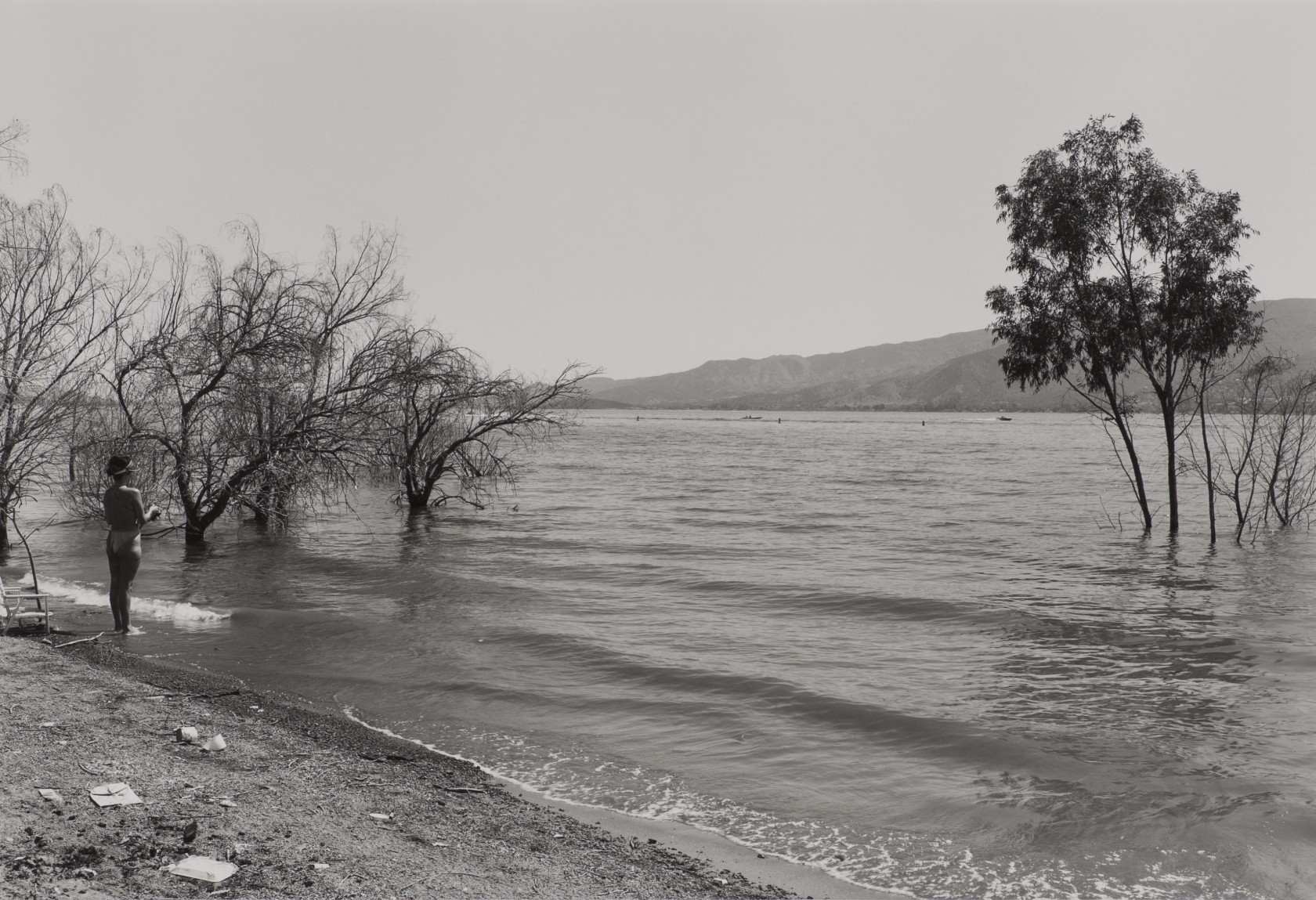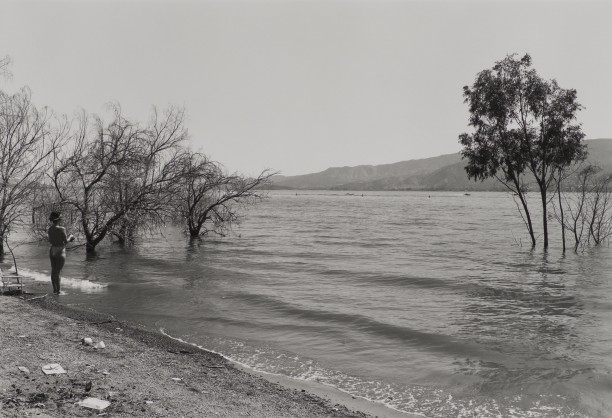Open to all, the new MOCA Climate Conversations series seeks to create a space for collective learning and dialogue, providing a platform for engaging with pressing topics, fostering awareness, and inspiring action around the diverse facets of climate, culture, and environmental justice. Events are free with advance registration.
During the inaugural event, attendees will engage in two thought-provoking sessions. Session One: Artist-led Activism explores the intricate connections between creative practice, placemaking, and ecological justice. During Session Two: Coastal Communities, speakers will tell ancient narratives of encroaching water, follow projections of coastal change, and share vital adaptations we must take to protect our planet.
Session 1: Artist-Led Activism 11 am - 1:30 pm
Isfald (Excerpt) by Jacob Kirkegaard
This sound work captures the deep booms of calving icebergs and the high pitched crackling of melting ice. Commissioned for the Louisiana Museum and recorded in Greenland in 2013. Excerpted work is courtesy of the artist.
Throughlines: Water, kinship, and artist-led activism
This program follows the fluid connections between water, activism, and k'é, the Navajo system of kinship. Diné sisters Emma Robbins, an artist and activist, and Isabella Robbins, an art historian, will explore creative placemaking on and away from their homelands in conversation with arts editor and independent curator Adrianne Ramsey.
Speakers: Adrianne Ramsey, Emma Robbins, Isabella Robbins
Overlapping Ecologies: Sky High Farm’s transdisciplinary approach to food sovereignty
This panel explores Sky High Farm’s transdisciplinary approach to food sovereignty through adaptive strategies that form an ecosystem of activities at the intersection of arts, public health, agriculture, and climate. The discussion will span Sky High’s evolutionary journey from growing food for donation for the urgent food system, to training the next generation of land stewards, to making grants to build a more equitable food system, and deploying community-based educational programming for youth that centers arts, cooking, agriculture, and climate.
Panelists: Josh Bardfield, Dan Colen, Laura Copelin, Li Schmidt, Sarah Workneh
Lunch 1:30 pm - 2:30 pm
Señoreata, a plant-based pop up, will be set up on the Grand Avenue Sculpture Plaza. Food will be available for purchase there, as well as at the museum cafe Lemonade and nearby Cal Marketplace and Grand Central Market.
Session Two: Coastal Communities 2:30 pm - 4:30 pm
Ancient Stories, Great Floods, and Future Earth
The Book of Genesis, Hindu epics, and indigenous stories from across the world all hide historical lessons about what we can expect if we continue to heat up our planet and melt the ice that's still left. This program weaves together these ancient flood narratives, historic sea level and flood reconstructions, and future sea level rise projections to illustrate the impact that ever-encroaching waters have on human life. In retelling these stories, Dr Benjamin Strauss carries forward lessons from our ancestors and posits how we can be better ancestors to future generations by mitigating our climate impact.
Speaker: Dr Benjamin Strauss
An Age of Adaptation: Lessons in place-keeping for coastal cities
From ancient Mesopotamians to the Mexica and Maldives peoples, humans have embraced living with higher water. Entire cultures have developed around high coastal groundwater by floating agriculture and buildings, or digging urban canals, mounds and superdikes. Specific constraints and aspirations can drive cities to adaptation instead of retreat, and California is well positioned to lead the world in building new urban districts that learn from the ancient past.
Speaker: Dr Kristina Hill
About the Speakers:
Joshua Bardfield, MPH, has spent his career in public service, working for a variety of domestic and international global health programs spanning the non-profit, civil-service, academic, and private sectors. Prior to becoming Sky High's Executive Director, he spent two decades designing and building public health programs focused on reproductive health and HIV care and treatment in North America, Central America, Asia, Africa, and Oceania. Josh earned his Master’s Degree in Public Health from Columbia University's Mailman School of Public Health and a Bachelor’s Degree in Political Science from Bard College.
Dan Colen is an artist whose work has been exhibited in institutional venues and is held in collections around the world. He consistently explores how the physical properties of mediums dictate their specific forms and symbolic resonances, and oscillates between rigorous artisanal technique and the aesthetics of chance and interconnectedness. His practice perpetually seeks out new modes of making and sharing; in 2011 he founded Sky High Farm, a nonprofit farm dedicated to diminishing food insecurity and promoting food sovereignty.
Laura Copelin is a curator, arts administrator, and writer who lives with her family in Tucson, Arizona. Her curatorial practice focuses on commissioning new work from artists at the intersection of visual art, poetry, ecology, activism, and philosophy. She is the Deputy Director & Co-Curator for MOCA Tucson where she has realized projects with a wide range of artists with international and local relevance, including Cecilia Vicuña, Lynn Xu, rafa esparza, Pia Camil, Jibade-Khalil Huffman, Gabriela Muñoz and jenea sanchez. Previously, she was the Executive Director & Curator at Ballroom Marfa.
Dr. Kristina Hill studies climate drivers, as well as design strategies for urban adaptation to coastal flooding and climate change. She uses groundwater mapping to develop urban design alternatives for the wide range of situations where seawalls and levees won’t work to prevent flooding. Her focus is on protecting low-income and minority communities that are vulnerable to health impacts from legacy contamination mobilized in groundwater. Kristina holds a PhD from Harvard University and is currently the Director of the Institute for Urban and Regional Development at UC Berkeley, where she supervises graduate programs in urban design and real estate development. Her new book project is about the need for adaptation to rising seas and extreme rain in ways that recognize the underground world of water in cities.
Adrianne Ramsey is an independent curator and arts editor. She has organized exhibitions and programming for Berkeley Art Center, Root Division, and USC Roski Galleries, and is the Founder and Editor-in-Chief of GIRLS, a publishing company that produces collaborative printed materials and a digital magazine featuring multigenerational and femme-identifying contemporary artists, curators, and thinkers. Her writing on contemporary art and culture has appeared in several publications and exhibition catalogs. She holds both a B.A. in Art History and an M.A. in Curatorial Practices from the University of Southern California.
Isabella Shey Robbins is a Diné scholar and PhD candidate in the History of Art and American Studies departments at Yale University. Her dissertation, “Relationality and Being: Indigeneity, Space and Transit in Global Contemporary Art,” considers how artists engage with their own communities and others within and across the settler states of the United States, Canada, and Australia. She has held curatorial positions at the Yale University Art Gallery, Haffenreffer Museum of Anthropology, and Cantor Arts Center. She proudly serves on the board of The Chapter House - L.A. and the Diné Studies Conference, Inc. Isabella earned a BA in Art History from Stanford University and an MA in Public Humanities from Brown University.
Emma Robbins (Diné) is an artist, activist, and community organizer. She is the Managing Director of Planet Women, a nonprofit who partners with women to create a healthy planet for all life. Prior to Planet Women, Emma was Executive Director of the Navajo Water Project, where she collaborated with communities on the Navajo Nation to get clean running water to the one in three Navajo families without it. Emma is also the founder of The Chapter House, an Indigenous women-led community arts space in Los Angeles, designed for Natives, and welcoming all. Emma completed her BFA at the School of the Art Institute of Chicago and studied Modern Latin American Art History in Buenos Aires, Argentina. Emma is a mother, has one Rez dog, and lives in Los Angeles.
Li Schmidt is a first generation Taiwanese American farmer based in Sacramento. In 2020 she started Cultural Roots Nursery with a mission to heal the connection between the Asian diaspora and ancestral foodways by increasing the abundance and availability of culturally important heritage plants. By fostering education and empowerment around learning how to grow food in home gardens, she works to support a food system where all can access culturally relevant foods. She holds a M.A. in Community Development with a focus on sustainable food systems and is a farmer member of the California Farmer Justice Collaborative and the Asian American Farmers Alliance.
Dr. Benjamin Strauss is CEO and chief scientist of Climate Central, a leading NGO dedicated to non-partisan communication of climate science to the public. Strauss's sea level rise research, maps, visualizations, and web tools have generated tens of thousands of appearances in worldwide media outlets and drawn millions of online users. Strauss has testified before the U.S. Senate, and his research has been cited by the White House and two UN Secretaries-General.
Sarah Workneh has worked in alternative education spaces for artists for over 20 years, and has served as Co-Director of the Skowhegan School of Painting & Sculpture since 2010. Sarah has lectured widely as a Visiting Artist/Critic at schools & programs around the US and has served as an advisor to both academic and residency programs, particularly around issues of equity. In 2020, she partnered with Linda Goode Bryant & ProjectEATS to convert one of the organization’s farms into a food pantry in Brownsville, NYC. Sarah has a BA in Linguistics & Russian and pursued graduate work focused on Social Movement Theory, Political Economy, & Liberation Theology.
Part of MOCA’s environmental programming, MOCA Climate Conversations are organized by Kelsey Shell, Environmental and Sustainability Strategist, with Alitzah Oros, Public Programming Associate, The Museum of Contemporary Art, Los Angeles.
Highlighting the museum’s work around climate, conservation, and environmental justice, MOCA’s environmental programs are guided by the work of the MOCA Environmental Council, the first sustainability council at a major arts museum in the United States. The environmental programs present artists, activists, and scholars committed to critical ecological issues in Los Angeles and globally.
The 2023 MOCA Climate Conversations are made possible by Nora McNeely Hurley and Manitou Fund.

